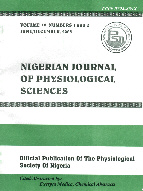
|
Nigerian Journal of Physiological Sciences
Physiological Society of Nigeria
ISSN: 0794-859X
Vol. 20, No. 1-2, 2005, pp. 69-73
|
 Bioline Code: np05013
Bioline Code: np05013
Full paper language: English
Document type: Research Article
Document available free of charge
|
|
|
Nigerian Journal of Physiological Sciences, Vol. 20, No. 1-2, 2005, pp. 69-73
| en |
PRELIMINARY FINDINGS ON THE EFFECT OF CHLOROQUINE ON GASTRIC ACID SECRETION IN ALBINO RATS.
Y. O. ETIMITA, S. A. BISONG, A. B. ANTAI, C. O. NKU, E. E. OSIM
Abstract
It is not certain whether chloroquine-induced pruritus is mainly attributable to the liberation of histamine, a powerful gastric acid secretagogue from mast cells, which may not be beneficial in peptic ulceration. Therefore, the aim of this study was to find out whether chloroquine (CQ) can stimulate gastric acid secretion in the rat. Gastric acid output was measured by the continuous perfusion of rats stomachs under anaesthesia with normal saline at the rate of 1ml per minutes. Thirty albino rats were divided into five groups of six rats each. Three groups had intraperitoneal administration of the following; normal saline (1ml/kg; control), CQ (3mg/kg; test) and Histamine H2 receptor antagonist, Ranitidine (4mg/kg) following CQ administration respectively. The other two groups had subcutaneous administration of histamine (100mg/kg) alone and histamine following CQ administration respectively. The basal acid secretion, (4.71± 0.05μmol/10mins) in a group of rats was not significantly increased in comparison with the peak acid output (p > 0.05) following normal saline administration (1ml/kg; i.p.). Administration of CQ in a second group significantly increased acid secretion to a peak of 7.2 ± 1.7μmol/10mins (p < 0.05). Ranitidine blocked CQ -induced acid secretion in a third group. Histamine significantly increased acid secretion from control level of 4.85 ± 0.14 μmol/10mins to 51.67 ± 5.07μmol/10mins (p < 0.001) in a fourth group, while CQ administered 2mins after histamine administration significantly increased acid level from 4.72 ± 0.12μmol/10mins to peak at 20.63 ± 3.28μmol/10mins (p < 0.001) in a fifth group of rats. The peak acid output in the fifth group was significantly lower than that obtained with histamine alone. In conclusion, chloroquine is a weak stimulant of gastric acid secretion rats. It inhibits histamine-stimulated acid secretion probably by occupying histamine H2-receptors in rats.
Keywords
Chloroquine, gastric acid secretion, Histamine
|
| |
© Copyright 2005 - Physiological Society of Nigeria
|
|
